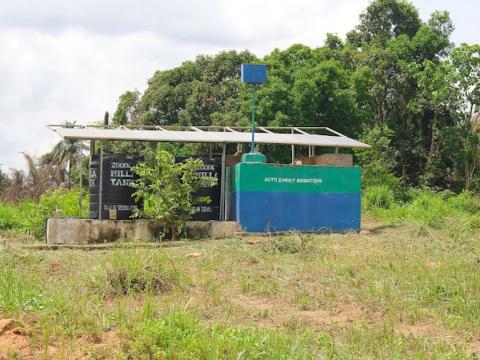By Mabinty M. Kamara in Kono
As part of efforts to improve farming and ensure food sufficiency in Sierra Leone, a group of farmers in Kono district in Eastern Sierra Leone has introduced innovative farming techniques that facilitate year round yield for both crops and poultry.
The initiative through the support of the German Development Cooperation body, GIZ has attracted over 400 youths to agriculture through what is known as the dual apprenticeship programme which enrolls them for both theoretical and practical experiences in the integrated modern farming techniques at the Yormata Youth Farmers group.
The group utilizes automated irrigation application through solar powered well water and can be used with the click of a button on any mobile phone, be it smart or not. “With this system here, a farmer doesn’t have to be physically present in the farm for them to irrigate their crop. I can be far away from the farm and still irrigate my farm at the appropriate time through the application in my phone. This also means that I can cultivate crops throughout the year regardless of whether it is dry or rainy season and so there will always be food and income for me as the farmer,” said the Programme’s Coordinator.
Speaking in an interview with Politico, Daniel Aiah Konoyima said after they benefited from the same GIZ supported skills development initiative dubbed Curriculum Development and Entrepreneurship Programme in 2019 in the form of giving back to the society, they started training young people with hands-on agricultural practices. In the farm, they practice animal husbandry through poultry and aquaculture, horticulture, poultry animal feed processing and crop farming.
He said after losing almost all of their birds during the COVID-19 period, they decided to produce a new breed of commercial layers that could withstand the climatic condition of Sierra Leone, be managed at a lower cost, and still lay the ISA brown eggs for commercial purposes. “These sets of birds are called the Yormata breeds and have a stronger resistance than the imported chicks for commercial purposes. We spend less on vaccination and record low mortality,” he said.
Konoyima said after being on the farm for six months, the trainees are now sent into their farms to manage over a period before they graduate and are released as trained farmers.
He called on the government and other development partners to continue to invest in agricultural infrastructure, mechanization and farmers' access to improved variety of seeds and farming practices for sustainable agriculture and food sufficiency in the country.
One of the beneficiaries of the programme- Sia Elizabeth Momorie, 25, told Politico that she had just completed her West African Certificate Examination when she saw the GIZ advertisement for enrolment into the dual apprenticeship programme for which she went through the application processes including interviews and was enrolled in the programme where they are taught the practical aspects of the course at the Government Technical Institute in Kono and another practical at the Yormata Youth Farm over a period of six months.
After Ms. Momorie and her Cohort graduated from the farm, they registered a group called Technical Corporation for Agricultural Development led by her where they do similar practices in which they were trained. “I can tell you that even if I have the opportunity of going to University, I will choose to study agricultural Science because agriculture is everything. It provides employment opportunities because it’s not everything that I can do in my farm so we employ the services of others. We also get money through the sale of our produce and still leave some to feed ourselves,” she said.
She encouraged other young people including women not to see agriculture as a field for dropouts or for the aged but a profitable venture that comes along with a lot of opportunities.
Another beneficiary of the project Shar Quee 23 said he wasn’t sure whether to apply for the programme or not because for him agriculture has always been a form of punishment especially by teachers. “When you do something bad in school, our teachers will send us to the school garden to work there as a form of punishment and we also saw that all those that were engaged in farming, especially our parents were mostly uneducated. So agriculture was never an option for us growing up,” he said.
Quee said he now holds a different perspective about farming. “It is lucrative and profitable. I am currently a supervisor in one of the rice farms owned by Yormata Company limited. Agriculture is not a punishment and to be able to feed Salone, you first have to feed yourself. And so start agriculture at any scale,” he emphasized.
A similar intervention is also done in Bombali through the German Development Corporation (GIZ) where a widow poultry farmer, Aminata Kamara of Edamit Farm was trained and her business revived for financial stability. Amanita’s enrollment into the Employment Promotion Programme transformed her struggling enterprise after the death of her husband who initiated the business into a successful enterprise through which she supports her three children through school and also meets other family needs.
In observance of Europe day, the EU team in Sierra Leone is on a nationwide bus tour to monitor the impact of the development projects supported by the EU and its member countries such as Ireland, Germany, France and the like in the West African country.
The visits according to the EU-Team will also help them identify gaps in their interventions for better outcome and foster the European Union –Sierra Leone development Cooperation through the support of key intervention areas of the government of Sierra Leone.
Copyright © 2024 Politico (20/05/24)








